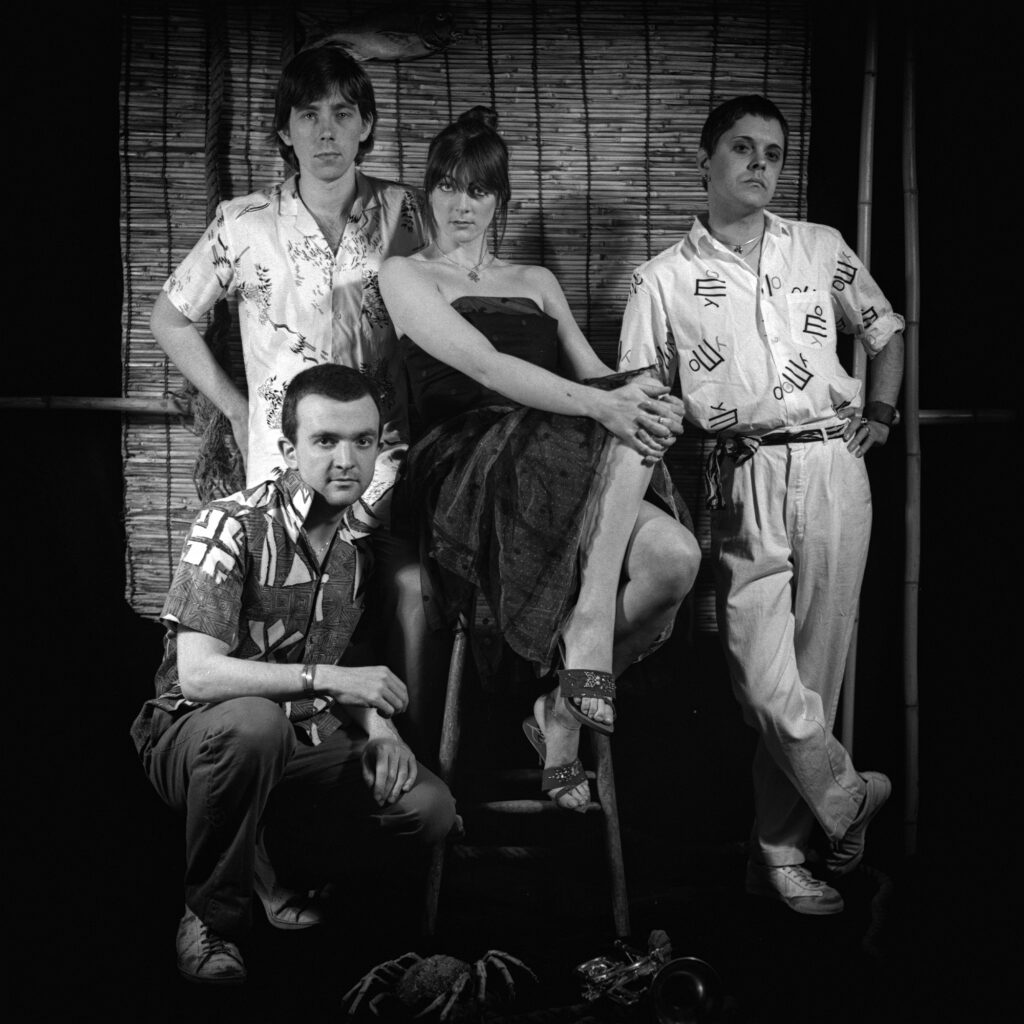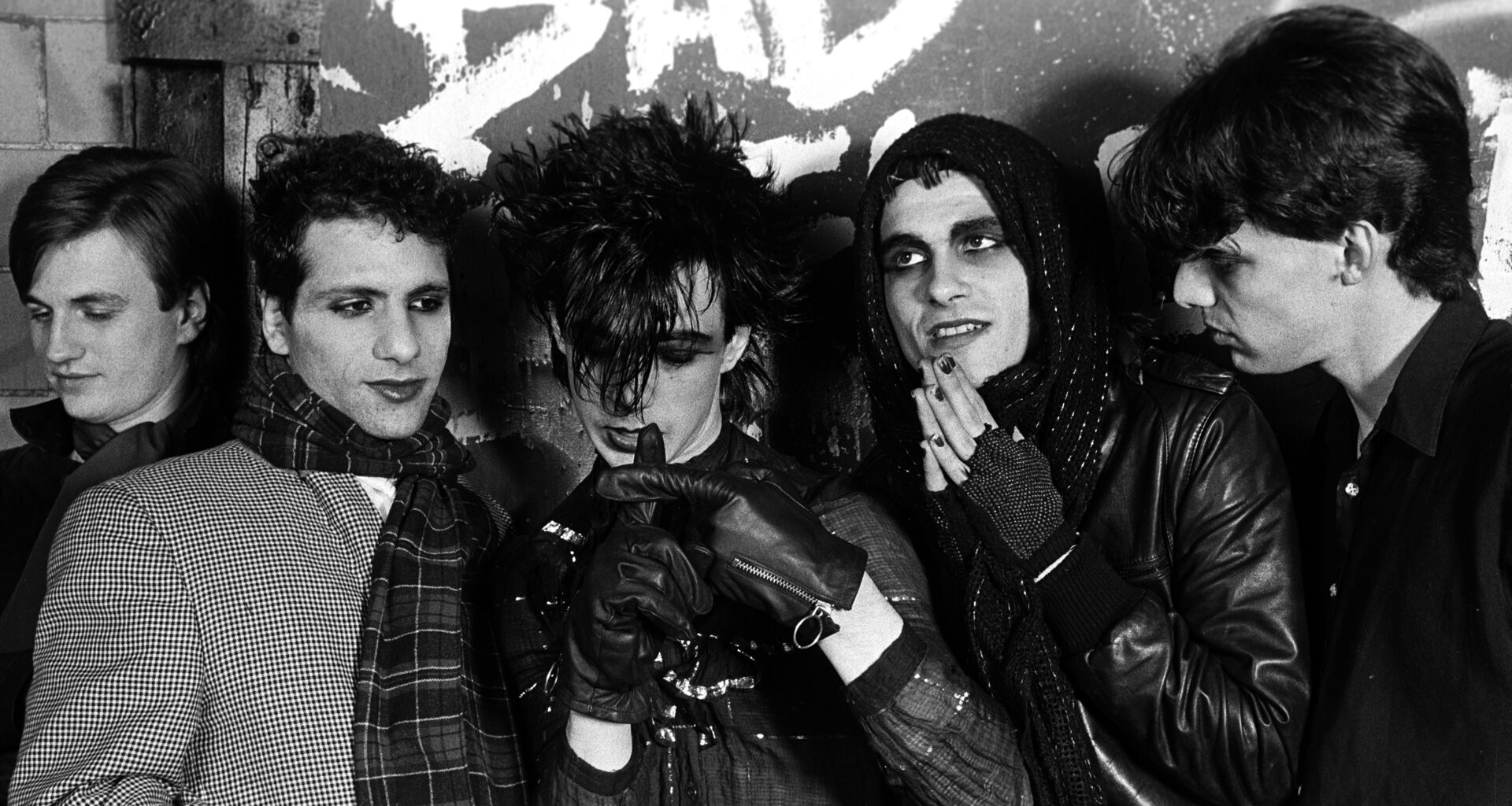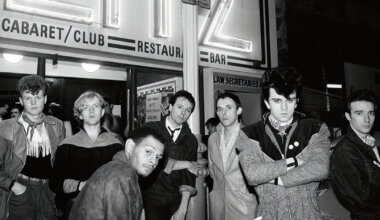Industrial Music. The genre that swept around the world from Hull (Throbbing Gristle) and Düsseldorf (DAF) to Chicago (WAX TRAX!) and Brussels (Play It Again Sam), and then span out into EBM and New Beat and a whole lot more besides. We pick out the main protagonists for your listening pleasure…
When electronic music first began to inveigle pop and rock in the 1970s, via the likes of Kraftwerk and Tangerine Dream, it did not feel bodily or dirty. It signified cosmic remoteness, the futurist faraway. In the case of Hütter and Co, it was clean, pallid, robotic, fey, barely sexual, the polar opposite of the bump ‘n’ grind and boogie of traditional rock ’n’ roll.
With the dawning of punk, however, the connotations around electronic music began to change. By the 1980s, there was a significant, electro (anti-) pop strain of the genre that was coated in sleaze – defiled and defiling, warped and perverse, transgressively sexual, the regularity of its beats intended as tyrannical and carrying strong undertones of S&M. Which is not to say that it was not also cerebral. This was thought-through, socially critical music in which the brain raged as hard as any other organ.
The Chicago-based Wax Trax! label, founded by Jim Nash and Dannie Flesher in the late 1970s, and whose first official release was Strike Under’s ‘Immediate Action’ EP in 1980, were responsible for disseminating what became codified as “industrial” throughout the remainder of the 20th century. The label is the subject of an upcoming documentary, ‘Industrial Accident’, which traces its rise and fall, the sad demise of its founders, and its recent revival. In conjunction with Play It Again Sam, Wax Trax! established a Euro-American alliance of rigorous, aggressively minimal, body/machine music, with a peculiar emphasis on Belgium, which thrived resolutely below ground on planet pop.
Before Wax Trax!, however, there was Throbbing Gristle, who in tandem with their more adrenaline, geopolitical-fixated Sheffield counterparts Cabaret Voltaire, created an electronic music that was mired in the toxic decay and moral depravity of 1970s Britain. TG were described as “wreckers of civilisation” by Tory MP Nicholas Fairbairn in 1976, but there was the irony – Fairbairn himself was a deeply controversial figure, guilty of sexual infidelities, a man of grotesquely sexist views and a virulent homophobe, the sort of Tory pillar of society who would eventually come to discredit the party in the 1990s.
Despite the apparent unhealthy satisfactions exhibited on ‘Zyklon B Zombie’ and ‘Hamburger Lady’, TG were full of high purpose. ‘Discipline’ isn’t just a parody of authoritarianism or an S&M reference to match its whiplash riff. It’s a genuine call for people to show moral rigour and self-examination, to use the Burroughs-inspired cut-up and mutant art of TG and the like to “decondition” themselves and query social norms. Theirs was not a protest against morality, but a protest against immorality.

While TG’s work continued through their offshoots, including Chris & Cosey and Coil, Deutsch Amerikanische Freundschaft (DAF) emerged on Mute in 1980 and scored a cult hit with ‘Der Mussolini’ the following year. DAF operated in the paradoxical realms of minimalist musical muscularity, faux-authoritarianism and libertarian hedonism. Hair ruthlessly clipped, they made homoerotic specimens of themselves on their record covers, their big, off-kilter beats flirting with all kinds of dubious imperatives, notably ‘Verschwende Deine Jugend’ (‘Waste Your Youth’) and ‘Absolute Body Control’. Ultimately, they were not decadents, but they were very serious about the business of sexuality, pleasure, identity and defiance, deployed with the same mordant irony as their contemporaries Swans on works like ‘Raping A Slave’. They were later emulated in a British context by the similarly physical Nitzer Ebb.
And then there was Wax Trax! Records. One of the label’s earliest releases was Ministry’s ‘Cold Life’, featuring Al Jourgensen. A cowboy-hatted extremist known for openly offering drugs in interviews, Jourgensen was more rock ’n’ roll than the rock ’n’ rollers, putting to shame the plethora of timid, tapered, poodle-haired, conservative guitar bands of the day. Another project of his was Revolting Cocks, also featuring Luc Van Acker and Chris Connelly, whose gigs boasted gyrating, bikini’d women, as captured on the live album ‘You Goddamned Son Of A Bitch’.
Revco seemed to wallow in lurid decadence and raise a smelly finger to political correctness, but like a lot of the electronic body music of the 80s, they were a response of sorts to the far more iniquitous and hypocritical Reaganomic era, beyond the dominant, WASP-ish pale of the right wing mix of piety and greed that characterised the decade. One of their key songs was ‘Union Carbide’, a reference to the deadly industrial disaster in Bhopal, India, which saw thousands perish thanks to gross corporate negligence. “Blood was running like water,” laments the track’s central sample. Other artists whose electronics had built-in critiques of North American culture were Bible Belt bashers Front Line Assembly and My Life With The Thrill Kill Kult, as well as anti-vivisectionists Skinny Puppy, whose mutant, vicious electronica mirrored the violence they were protesting against.
“James Brown could never have come from Belgium,” Henry Rollins once spat, as if to suggest the country was constitutionally incapable of producing musical excitement. Yet it was a fulcrum in the 1980s, in part from the new beat scene, with the likes of Jade 4U and Lords Of Acid fronting powerful basement productions destined never to be heard in daylight. Heavier still were à;GRUMH, typographical beat terrorists calculated to strike fear into the hearts of homophobes, and Front 242, whose 1988 hit ‘Headhunter’ was a huge seller for Play It Again Sam. Front 242’s irresistible, pulverising electronics flirted provocatively with the authoritarian tendencies which lurked at the heart of the pop spectacle on numbers like ‘Masterhit’ and ‘Tyranny For You’, as well as geopolitics on ‘Funkhadafi’.
From elsewhere, both before and after, came Clock DVA and Monte Cazazza and Test Dept and SPK and Die Krupps and Whitehouse and lots more. Even Switzerland got in on the act, producing The Young Gods, whose devastating assemblages of rock samples were delivered with a sensual, lascivious growl by frontman Franz Treichler, but who represented a sort of holy, elemental purity, as reflected in titles like ‘L’Eau Rouge’.
Wax Trax! and the industrial genre persisted into the 90s, but in many ways it belonged to, and was a response to, 1980s pop and its broader culture. Eventually, the genre became codified and slightly cliched. It’s only now that we can look back on its greatest achievements and recognise it as a magnificent eruption of electric sleaze, the like of which could probably not occur today.






